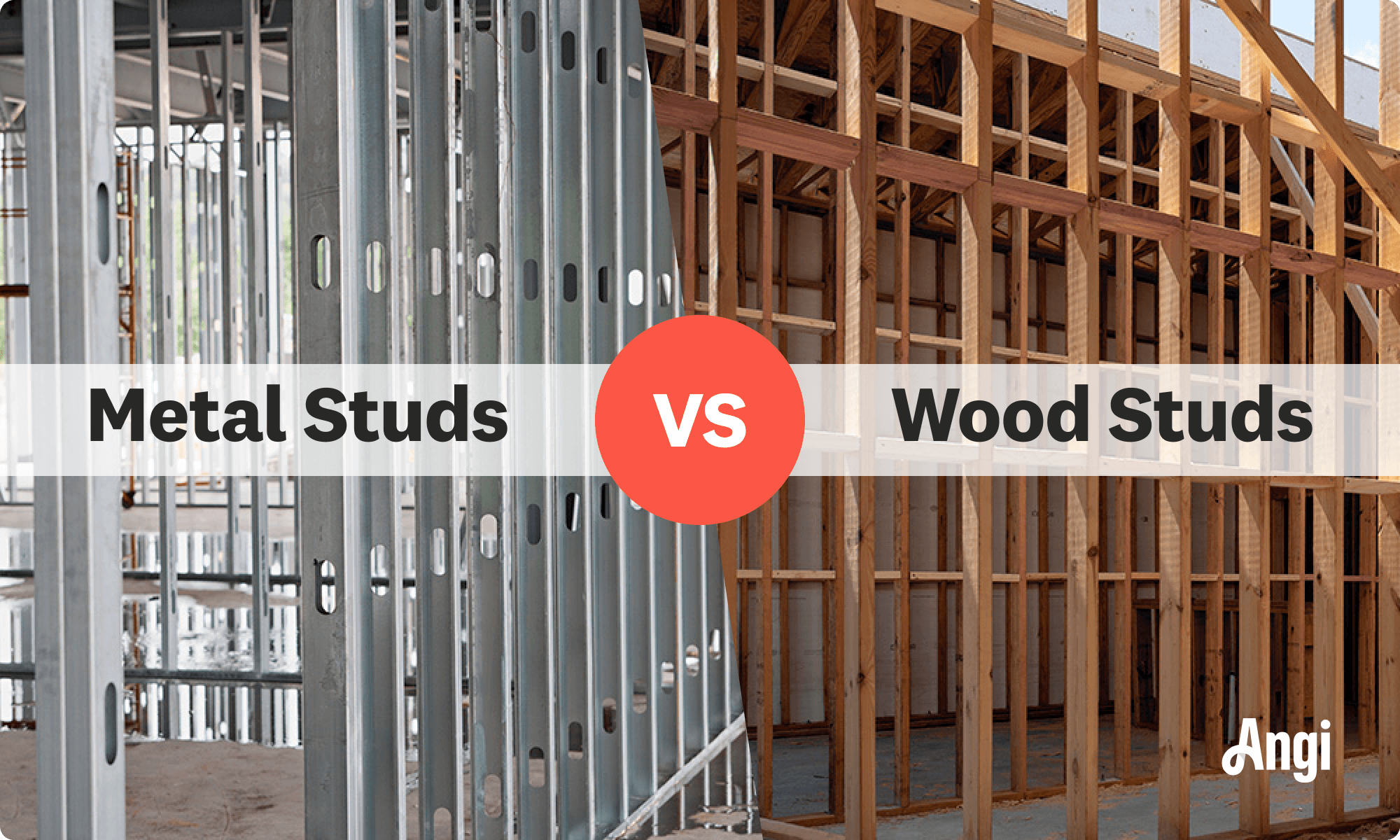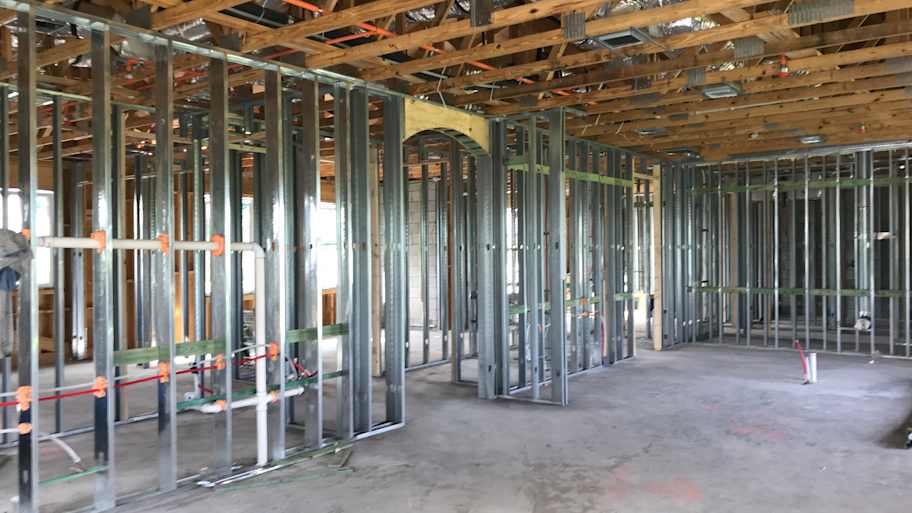
Strong floor joists are the key to a structurally safe home. The cost of floor joist repair will often come down to what is causing the problem.
The cost of metal stud framing ranges from $19,000 to $25,000, with an average of $21,000. The type and size of the structure you're building are the most significant pricing factors.


The size of your framing project and the type of structure you're creating are the major players in determining the cost of metal stud framing.
The average cost of metal stud framing, including labor and materials, is between $7 and $14 per square foot.
Metal stud and wooden stud framing have similar associated costs, depending on market conditions.
Metal stud framing has benefits over wood construction in terms of rot, pest, and fire resistance.
Are you looking for a pest, fire, and rot-resistant framing material to replace wood? Metal stud framing costs range anywhere from $13,000 for simple, interior applications to $31,000 for full-structure, exterior walls using heavy-gauge steel. Most consumers spend an average of $21,000. Your total cost will depend on numerous variables.
Unlike framing with nominal lumber, metal studs are available in several gauges or metal thicknesses. Gauges from 20 to 25 are common for interior wall structures, while 16 or 18 gauge steel studs are for exterior and supporting wall applications. The lower the gauge number, the thicker and more rigid the component.
For that reason, the type of structure you're building matters in pricing terms. If you're remodeling an interior space and are only constructing interior walls with thin-gauge metal studs, you can expect material costs closer to the bottom of the average material pricing scale of between $2 and $4 per square foot.
However, expect to spend closer to the maximum of that range for exterior-wall construction or to build specialty structures. For example, expect your roof framing costs using metal to be higher than with wood construction.

The size of your project is the most significant pricing factor for both materials and labor. Additionally, building multi-story structures will add to the cost of framing a house due to the need for thicker gauge steel material and the addition of support structures, such as beams and joists.
The average cost of metal stud framing, including labor and materials, is $7 to $14 per square foot. That breaks down to between $5 and $10 per square foot for labor and between $2 and $4 per square foot for materials. However, you should expect additional costs of between $15 and $75 per linear foot where steel beams and other support structures are necessary.
| Size of Project (Square Feet) | Average Cost Range |
|---|---|
| 200 | $1,400–2,800 |
| 500 | $3,500–2,800 |
| 1000 | $10,000–14,000 |
| 1500 | $13,500–21,000 |
| 2000 | $19,000–28,000 |
For all but simple DIY remodeling that involves constructing a wall or two, hiring a local framing contractor is necessary for most metal stud framing projects. Your contractor will handle all aspects of obtaining the material, permits, and managing the project, including supplying labor.
The cost of hiring a framing contractor adds between 10% and 20% to the total job cost. For small projects, your contractor may charge an hourly rate of between $50 and $150 per hour.
Depending on the type of structure you're building, the services of an electrician to help make the space livable or usable may be necessary. The average cost to hire an electrician is between $50 and $130, plus additional charges for materials and trip fees. However, they may offer standard rates for some services.
Installing an outlet: $100–$450
Installing a light fixture: $160– $1,015
Rewiring: $130–$6,200
If your metal stud framing project includes the addition of a wet wall or two for a kitchen or bathroom, you may also need plumbing installation or re-piping services. The average cost to hire a plumber is between $45 and $200 per hour.
Installing a sink: $215–$665
Installing a shower: $6,000–$12,000
Replacing pipes: $370–$2,130
Rough-in plumbing for a bathroom: $3,000–$20,000
While a small remodeling project may not require much more than adding a metal stud wall or two, larger projects demand more planning and preparation. Depending on the type of metal stud framing project you're tackling, you may also require the services of one or more of the following professionals.
Architect: $2,200–$11,560
Interior Designer: $2,060–$15,215
Foundation Builder: $4,015–$14,820
Excavation: $1,660–$6,710

Your metal stud framing project will be subject to price variations based on your location. Whether you're using metal or wood stud materials, the cost differences relate closely to the cost of living and the price of labor in your area.
| State | Average Metal Stud Framing Cost (2,000 Sq. Ft. House) |
|---|---|
| California | $26,000 |
| Colorado | $21,000 |
| Louisiana | $16,000 |
| Minnesota | $25,000 |
| New York | $27,000 |
| North Carolina | $16,000 |
| Texas | $17,000 |
Several additional cost factors will impact the total price of your metal stud framing project. While additional costs related to the actual construction of the project will be part of your contractor's pricing bid, there are also factors, such as taxes and insurance, to consider.
Depending on the project's scope, you'll need more or less demo and prep work before your metal stud framing project can begin. Expect to pay between $50 and $150 per hour for demolition work for remodeling or prep work for new construction.
Because you're altering or adding a structure, your contractor will need to obtain a building permit for the job. Permit costs average between $525 and $3,040 for construction projects, depending on scope.
If your metal stud framing project changes the layout of your home, adds square footage to the living space, or increases the property's value, your taxes and insurance costs will adjust accordingly. Discuss tax implications with a tax professional and report changes to your home to your insurance company to make sure your coverage remains adequate.
Framing with metal studs is a solid skill to add to your DIY toolkit. However, only highly experienced DIYers should attempt to construct anything more significant than adding an interior wall or two for a remodeling project.
In those situations, doing the job yourself can save up to 40% of the job cost. However, the task requires significant know-how and time to accomplish.
Most homeowners allow the pros to do the work. Hiring a local framing contractor ensures proper completion and code compliance, and will include a builder's warranty for your protection.
For large framing jobs involving load-bearing walls, it's best to hire a licensed framing or general contractor with extensive framing experience rather than a handyperson. These pros have the proper knowledge of structural engineering and permit requirements. A local handyperson can handle small-scale framing tasks, like building a partition wall.
While metal studs are highly resistant to pests, fire, rot, and warping, they can suffer damage. Additionally, if they experience an impact or lengthy water submersion to the point of rusting, they can lose much of their structural integrity. Replacing damaged metal studs is the best route.
However, if an accident or weather-caused damage is the culprit, you can often simply repair the damaged sections, making sure to replace structurally compromised studs.
As a rule, if the damage repair estimate is more than 50% of the cost of replacing the section with damage, it makes sense to start from scratch and construct a new wall or structure.
For large metal stud framing projects, employing the DIY method to save money isn't a viable option. However, when working with a contractor, there are still several ways to help manage costs.
Specify that you wish to use lighter-gauge studs for interior, non-load-bearing walls where building code allows.
Work with your designer or architect to create a layout that minimizes material and labor waste.
Work with your contractor's schedule to negotiate for better pricing during off-peak seasons.
Metal stud framing can increase your home's value under specific conditions. While the dollar-amount ROI for metal stud framing isn't significant over other framing types, if you live in a humid, hot, or fire-prone location, the selling appeal, based on safety and longevity, can have a positive impact on the value of your home and its selling price.
Home is the most important place on earth, which is why Angi has helped more than 150 million homeowners transform their houses into homes they adore. To help homeowners with their next project, Angi provides readers with the most accurate cost data and upholds strict editorial standards. We extensively research project costs to develop the pricing data you see, so you can make the best decisions for you and your home. We rely on reputable sources, including the U.S. Bureau of Labor Statistics, academic journals, market studies, and interviews with industry experts—all to ensure our prices reflect real-world projects.
Want to help us improve our cost data? Send us a recent project quote to [email protected]. Quotes and personal information will not be shared publicly.
From average costs to expert advice, get all the answers you need to get your job done.

Strong floor joists are the key to a structurally safe home. The cost of floor joist repair will often come down to what is causing the problem.

When your home project requires a professional at the helm, how much are construction management fees, and how do they determine their rate? Let's break it down.

Recessed living rooms used to be popular but have fallen out of favor. This guide discusses the cost to raise a sunken living room to modernize your home.

Want to learn how to frame a ceiling for drywall? Keep reading for a step-by-step guide to tackling this impressive DIY on your own.

If your contractor causes water damage during a home project, there are several steps to take. Learn how to handle this situation so it can get resolved ASAP.

As you ring in the new year, you may wonder: What are the top home improvement ideas of 2026? Read on for a full breakdown of in-demand projects on the horizon.